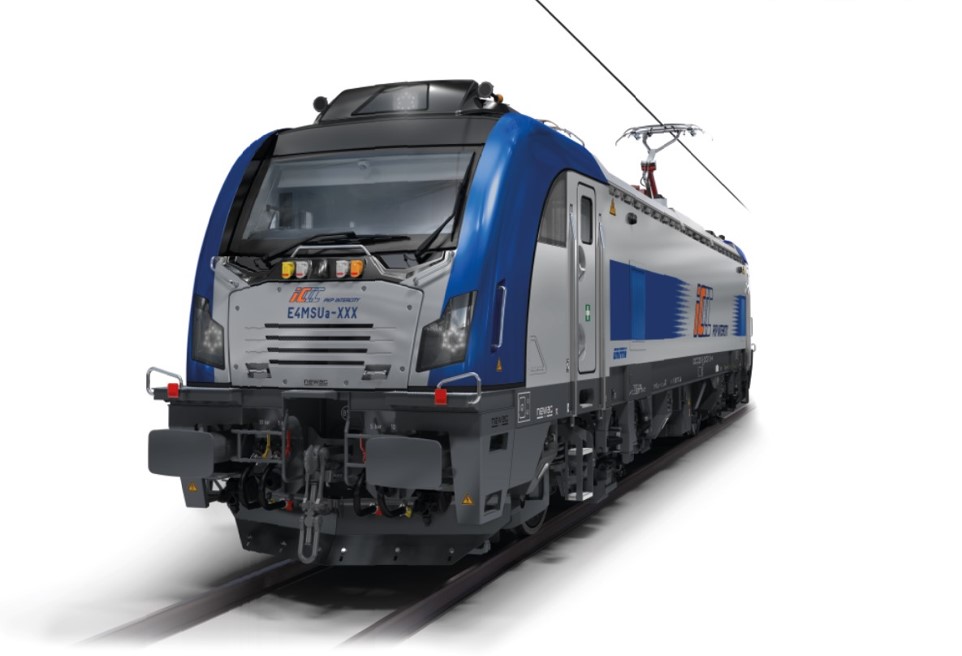 PKP Intercity ordered from Newag 5 additional multi-system electric locomotives, exercising its option under a contract signed in October 2021 for 10 vehicles.
PKP Intercity ordered from Newag 5 additional multi-system electric locomotives, exercising its option under a contract signed in October 2021 for 10 vehicles.
With the new locomotives, the value of the contract increased from PLN 258.6 million (EUR 58.2 million) to PLN 388 million (EUR 87.4 million).
Newag will also provide technical maintenance services for locomotives. Under the contract, periodic repairs at the fourth maintenance level will be carried out.
Ordering the new locomotives brings the fleet to 15 vehicles able to run at a speed of up to 200 km/h. The first purchased vehicles will be on the tracks at the turn of 2023 and 2024.
The locomotives will be homologated for six European countries and under the contract, Newag will have to obtain permission to operate vehicles in Poland, Germany, Austria, the Czech Republic, Slovakia and Hungary. The locomotives will be equipped with ETCS Level 2, with a remote diagnostics system that will allow real-time monitoring of locomotive operation, which will translate into their effective operation. The new multi-system locomotives will be able to run on railway lines with three power supply systems (3kV DC, 15kV AC, 25kV AC).
On Polish rail network, the locomotives will run on the lines connecting Warsaw with Gdynia, Poznan, Wroclaw, Katowice and Krakow. After obtaining approval in Germany and the Czech Republic, the new locomotives will run on the lines connecting Berlin and Warsaw, Przemyśl and Gdynia and on the Gdynia – Warsaw – Katowice – Vienna route (on the section to Bohumin, in the Czech Republic).
“Thanks to this investment, Polish people will get to many cities in the country and in Europe much faster. The effects of implementing our rolling stock strategy are becoming more and more visible. The company is constantly developing, and our hard work is appreciated by passengers who are increasingly willing to choose PKP Intercity services,” Jarosław Oniszczuk, member of the management board of PKP Intercity said.
At the end of 2020, the operator took delivery of the last of the 30 modern electric locomotives of the EU160 Griffin series which are able to run at a speed of up to 160 km/h. the contract for these locomotives has a value of PLN 551.4 million (EUR 124.2 million) and the locomotives were delivered in 11 months. Following this milestone, the Polosh rail operator has also ordered 20 Griffin electric locomotives in March 2023.
“Investments in railways are extremely important from the point of view of the economy and development of our country. Thanks to new vehicles, more and more Polish citizens have access to fast and safe transport. The purchase of these additional locomotives from the Polish manufacturer is proof that the money on the railways is well managed,” Maciej Małecki, the Secretary of State in the Ministry of State Assets said.
In January, PKP Intericty has announced its rolling stock plans for 2023 including the contract for push-pull trains, 38 seven-car double decker trains and 45 multi-system electric locomotives.
An important contract is also expected to be signed this year for 63 multi-system locomotives including options for 32 additional locomotives.
Following the tender for the purchase of 300 carriages, including options for 150 additional vehicles, PKP Intercity also plans to sign the contract this year.
The new ordered multi-system electric locomotives as well as the future contracts to be signed are part of the PKP Intercity’s rolling stock investment programme with a total value of PLN 27 billion (EUR 6 billion).
The implementation of the PKP Intercity rolling stock programme will result in doubling the fleet until 2030 providing increased capacity and access as well as rapid services. Traveling at a speed obetween 160 km/h and 250 km/h will become the norm, which will shorten travel times.
Higher comfort and functionality will be ensured by the new design of the space inside the trains, the assumptions of which are currently being worked on. The new vehicles will be adapted to the needs of various groups of travelers, such as the people with disabilities or families with children.
In 2030, the entire fleet of the carrier will be new or modernised, which will ensure a high level of travel safety and comfort. Massive investments in modern trains will drive further development of railways as the most ecological means of collective transport, in line with the assumptions of the European Green Deal.
Share on:






